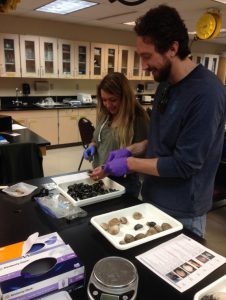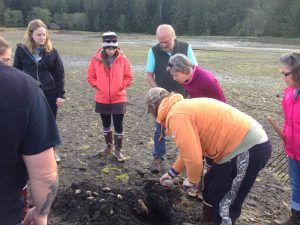
Recent analyses conducted by the Sitka Tribe of Alaska Environmental Research Laboratory (STAERL) identified lethal levels of algal-produced toxin-like activity in shellfish from two Southeast Alaska sites in late May. Blue mussels, cockles, and butter clams were found to contain up to 46 times the regulatory limit for saxitoxins. Results from testing were shared with community members providing potentially lifesaving information about the risks from algal toxins associated with consumption of shellfish collected during subsistence harvests.
Shellfish take up toxins produced by harmful algal bloom (HAB) species, which can harm people if consumed. NCCOS developed and validated the toxin-monitoring techniques, called receptor-binding assays, which are being used by the Southeast Alaska Tribal Toxins (SEATT) Partnership to protect Southeast Alaskans from potentially eating contaminated shellfish.
At a recent SEATT workshop held in Sitka, Alaska, representatives from tribal communities learned how to sample and submit shellfish samples to the STAERL for testing for shellfish toxins using the receptor-binding assay for saxitoxin. This effort is a component of the newly developed coordinated HAB action plan for Alaska.
For more information, contact Tod.Leighfield@noaa.gov.

Related News and Features
NCCOS Provides Training to a Centralized Algal Toxin Testing Laboratory for Southeast Alaskan Tribes (NCCOS News and Features, March 16, 2016)
Alaskan Tribal Communities Trained for Testing Paralytic Shellfish Toxins (NCCOS News and Features, December 10, 2014)
Helping Alaska Tribe Launch a Harmful Algal Bloom Monitoring Program (NCCOS News and Features, November 15, 2013)
